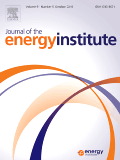
JOURNAL OF THE ENERGY INSTITUTE
Scope & Guideline
Illuminating Pathways to Energy Efficiency and Innovation
Introduction
Aims and Scopes
- Energy Conversion Technologies:
Research on various methods for converting different types of biomass, waste, and fossil fuels into energy, including gasification, pyrolysis, and combustion. - Catalysis and Reaction Engineering:
Exploration of catalytic processes and mechanisms involved in the conversion of hydrocarbons, biomass, and waste materials to fuels and chemicals. - Environmental Impact and Emission Control:
Studies focused on the emissions generated from various energy processes and technologies, including NOx, SO2, and particulate matter, and methods for their mitigation. - Thermochemical Processes:
Investigation of thermochemical reactions for energy production, including the kinetics and thermodynamics of pyrolysis, gasification, and combustion. - Innovative Fuel Technologies:
Development and optimization of alternative fuels, including biofuels, syngas, and hydrogen production from various feedstocks. - Waste to Energy Solutions:
Research on the conversion of municipal solid waste and other types of waste into usable energy forms, emphasizing sustainability and circular economy principles.
Trending and Emerging
- Biomass and Waste Valorization:
Increasing research on converting biomass and waste materials into energy and value-added products, highlighting the importance of sustainable practices in energy production. - Advanced Catalytic Processes:
Growing interest in novel catalytic materials and processes that enhance efficiency in converting hydrocarbons and biomass, including the use of nanocatalysts and biochar. - Hydrogen Production and Utilization:
A significant uptick in research focused on hydrogen as a clean energy carrier, including production via electrolysis, steam reforming, and biomass gasification. - Integrated Energy Systems:
Emerging studies on hybrid energy systems that combine various technologies (like solar, wind, and biomass) for improved energy efficiency and reliability. - Carbon Capture and Storage (CCS) Technologies:
Rising emphasis on technologies aimed at capturing and storing carbon emissions from energy processes, reflecting global efforts to mitigate climate change. - Innovative Combustion Techniques:
Research into advanced combustion technologies, including oxy-fuel combustion and MILD combustion, which aim to reduce emissions and improve efficiency.
Declining or Waning
- Traditional Fossil Fuel Combustion:
Research on conventional combustion processes of fossil fuels without significant innovation or integration of cleaner technologies appears to be waning as the focus shifts towards cleaner alternatives. - Basic Theoretical Studies:
Theoretical studies without practical applications or experimental validation have seen reduced emphasis, as the journal prioritizes research with direct implications for energy technologies. - Single-Feedstock Studies:
Research concentrating solely on a single type of feedstock (e.g., only coal or only biomass) is declining in favor of studies exploring co-processing and synergies between different feedstocks. - Conventional Energy Storage Solutions:
Research centered on traditional energy storage technologies, such as pumped hydro or lead-acid batteries, is decreasing, possibly due to increased interest in newer technologies like lithium-ion and flow batteries. - Non-Sustainable Practices:
There is a noticeable reduction in research focused on non-sustainable energy practices, reflecting a broader industry shift towards sustainability and carbon neutrality.
Similar Journals
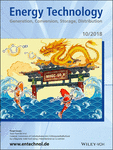
Energy Technology
Empowering Research for Sustainable SolutionsEnergy Technology, published by Wiley-VCH Verlag GmbH, is a prominent peer-reviewed journal dedicated to advancing the field of energy research and technology. With an ISSN of 2194-4288 and an E-ISSN of 2194-4296, this journal has made a significant impact in the energy sector, holding a Q2 category ranking in the Energy (miscellaneous) category for 2023, and proudly positioned in the 77th percentile within the Scopus ranking for General Energy. Since its inception in 2013, Energy Technology has consistently published cutting-edge research, innovations, and reviews that cater to a wide array of topics including renewable energy, sustainable technologies, and energy efficiency. The journal does not offer open access, yet it remains a key resource for researchers, professionals, and students who are committed to exploring the dynamic field of energy. The journal's efforts to disseminate rigorous scholarship make it an invaluable asset for anyone looking to contribute to or understand the future of energy-related technologies until 2024.

INTERNATIONAL JOURNAL OF ENERGY RESEARCH
Pioneering research for a sustainable energy landscape.INTERNATIONAL JOURNAL OF ENERGY RESEARCH (ISSN: 0363-907X; E-ISSN: 1099-114X), published by Wiley-Hindawi, stands at the forefront of energy research, offering a scholarly platform pivotal for advancing knowledge in the fields of energy engineering, nuclear energy, fuel technology, and renewable energy systems. With an impressive Q1 and Q2 ranking across several categories as of 2023, this journal reflects a commitment to high-quality, peer-reviewed research that addresses both theoretical and practical challenges in the energy sector. Now an Open Access journal since 2023, it enhances accessibility and dissemination of cutting-edge research to a global audience. Located in the United Kingdom, with an active publication history dating back to 1977, the journal aims to contribute to sustainable energy solutions and innovative technologies. Researchers, professionals, and scholars will find valuable insights and discussions here, bridging gaps in energy research and policy-making.
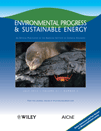
Environmental Progress & Sustainable Energy
Catalyzing progress in sustainable practices and technologies.Environmental Progress & Sustainable Energy, published by WILEY, is an influential journal dedicated to the crucial fields of environmental science and sustainable energy. Since its inception in 2009, this journal has consistently aimed to advance knowledge and understanding of innovative approaches and technologies that promote sustainability across various sectors. With an impact factor reflective of its strong academic contributions, the journal is catapulted into Q2 and Q3 quartiles across multiple categories, including Chemical Engineering and Environmental Science, demonstrating its central role in the dialogue surrounding pressing environmental issues. Researchers and professionals can access its cutting-edge studies through both traditional and open access options, facilitating the dissemination of knowledge globally. Addressed to an array of stakeholders from academia and industry alike, Environmental Progress & Sustainable Energy is not only a repository of research but also a platform for transformative ideas that aim to pave the way for a more sustainable future, making it an essential resource for those committed to the interplay of environmental stewardship and energy innovation.

Journal of the Japan Institute of Energy
Advancing Sustainable Energy Solutions.Journal of the Japan Institute of Energy, ISSN 0916-8753, is a reputable academic journal dedicated to the field of energy studies, reflecting the dynamic and evolving landscape of energy research. Published by the Japan Institute of Energy, the journal serves as a platform for disseminating innovative research, technologies, and methodologies related to energy engineering, renewable energy sources, and sustainability practices. While this journal does not currently offer open access, it remains a vital resource for professionals, researchers, and students alike, particularly those focused on advancing knowledge within Energy Engineering and Power Technology, Fuel Technology, and related areas. As of 2023, it is ranked in the Q4 quartile across several categories in Scopus, which highlights its foundational role in fostering scholarly discourse, despite its lower ranking in the competitive global landscape. Established in 1990 and continuously evolving, the journal provides insights into the challenges and innovations in the energy sector, making it an essential read for anyone invested in the future of energy solutions.
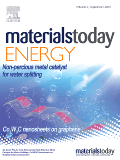
Materials Today Energy
Empowering Research for a Greener Energy FutureMaterials Today Energy is a premier journal published by Elsevier, focusing on the interdisciplinary field of energy materials. With an ISSN of 2468-6069, the journal is renowned for its impactful research as evidenced by its impressive Q1 quartile rankings in multiple categories including Energy Engineering and Power Technology, Fuel Technology, and Renewable Energy. It stands out with strong Scopus rankings, highlighting its significance in the respective research communities, such as being ranked 3rd in Nuclear Energy and Engineering. Established from 2016 to 2024, the journal aims to provide a platform for innovative research that addresses the global demands for sustainable energy solutions. Although it is not open access, Materials Today Energy is accessible to a broad audience, encouraging collaborations among researchers, professionals, and students in the pursuit of advancing materials science and energy technologies. This makes it an essential resource for those looking to remain at the forefront of discoveries that shape the future of energy.
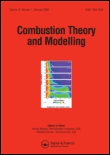
COMBUSTION THEORY AND MODELLING
Fueling Progress in Energy and Combustion ModellingCombustion Theory and Modelling is a pivotal journal for researchers and professionals in the fields of chemical engineering, energy technology, and combustion science. Published by Taylor & Francis Ltd, this journal, with an ISSN of 1364-7830 and E-ISSN 1741-3559, provides a platform for disseminating significant advances in our understanding of combustion processes and their applications. With a solid impact factor, as reflected in its Q2 ranking across multiple categories including Chemical Engineering, Energy Engineering, and Modeling and Simulation, it serves not only to enhance theoretical knowledge but also to bridge the gap between theory and practical applications. The journal spans a wide timeline from 1997 to 2024, ensuring that it covers both foundational studies and cutting-edge research. Situated in the UK, the journal actively invites submissions that contribute to the evolving landscape of combustion science, making it an essential resource for academics, industry professionals, and students keen on exploring the dynamics of energy and fuel technologies.
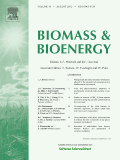
BIOMASS & BIOENERGY
Advancing Sustainable Energy SolutionsBIOMASS & BIOENERGY, published by Pergamon-Elsevier Science Ltd, is a premier academic journal focusing on the interdisciplinary fields of biomass and bioenergy research. With its impressive impact reflected in its 2023 Q1 rankings across multiple categories, including Agronomy and Crop Science, Forestry, Waste Management and Disposal, and a solid Q2 in Renewable Energy, Sustainability and the Environment, this journal stands at the forefront of advancing knowledge in renewable resources and sustainable practices. Established in 1991, it serves as a vital platform for researchers, professionals, and students to disseminate groundbreaking studies and innovative findings that shape the future of renewable energy. Though it does not currently offer open access, the journal's high ranking on Scopus, particularly its 95th percentile rank in key agricultural and environmental science categories, underscores its significance in promoting critical discourse and scientific advancements in biomass utilization and energy generation.
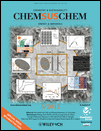
ChemSusChem
Connecting Chemistry with Sustainability for Global ImpactChemSusChem is a premier interdisciplinary journal, published by WILEY-V C H VERLAG GMBH, that focuses on the critical fields of Chemical Engineering, Energy, Environmental Chemistry, and Materials Science. Since its inception in 2008, the journal has consistently maintained a Q1 ranking across multiple categories, highlighting its role as a vital resource for researchers and professionals dedicated to advancing sustainable chemical processes and technologies. With an impressive impact factor, it ranks 12th in General Chemical Engineering and is highly regarded within its scopes, indicating the journal's commitment to publishing high-quality, innovative research that addresses global challenges in energy and environmental sustainability. Though it operates on a subscription model, its contributions are essential for those in academia and industry seeking cutting-edge developments in sustainable chemistry. As it approaches its convergence span through 2024, ChemSusChem continues to shape the future of sustainable chemistry, making it a must-read for students, researchers, and practitioners alike.
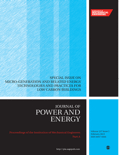
PROCEEDINGS OF THE INSTITUTION OF MECHANICAL ENGINEERS PART A-JOURNAL OF POWER AND ENERGY
Empowering Research for a Sustainable FuturePROCEEDINGS OF THE INSTITUTION OF MECHANICAL ENGINEERS PART A-JOURNAL OF POWER AND ENERGY, published by SAGE PUBLICATIONS LTD, is a pivotal journal dedicated to advancing the fields of mechanical engineering and energy technology. With a history spanning from 1983 to 2024, this journal provides a respected platform for researchers and practitioners to disseminate findings that address contemporary challenges in power generation, energy efficiency, and sustainable engineering practices. As evidenced by its quarter ranking in Q3 within the categories of Energy Engineering and Power Technology, and Mechanical Engineering, it serves as a significant resource for academics aiming to enhance their understanding and explore innovation in these critical areas. While currently not an open-access journal, the research published here is invaluable for both ongoing education and professional practice, making it an essential read for anyone engaged in the engineering disciplines.

Carbon Energy
Illuminating breakthroughs in energy and sustainability.Welcome to Carbon Energy, an esteemed open-access journal published by WILEY that focuses on cutting-edge research in the field of energy and materials science. Since its inception in 2019, this journal has quickly established itself as a leading platform for disseminating impactful findings and innovations related to carbon-based energy solutions, renewable resources, and sustainability practices. With its impressive Q1 rankings in multiple categories—including Energy (miscellaneous), Materials Chemistry, and Renewable Energy—Carbon Energy is recognized for delivering high-quality, peer-reviewed content that meets the rigorous standards of the academic community. Through its open-access model, the journal ensures wide accessibility of research findings, making it an invaluable resource for researchers, professionals, and students alike. As we look toward the future, Carbon Energy aims to further its mission of advancing sustainable energy technologies and promoting interdisciplinary collaboration in tackling global energy challenges.